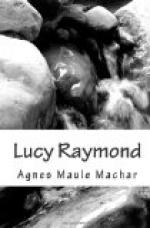However, she adhered to her original determination of wearing the simple India muslin, which had been her own dear mother’s bridal dress (its trimmings having been worked by her own hands), and all Stella’s representations that it was “old-fashioned” failed to produce any effect. She would indeed have felt it treason to admit its inferiority to any of her cousin’s more stylish dresses. But, to please Stella, she accepted the loan of a sash pressed upon her by her cousin, who took a considerable amount of trouble in the arrangement of her toilet, and in weaving, with innate skill, a graceful wreath of delicate pink rosebuds and green leaves, which she fastened on Lucy’s dark hair, and pronounced the effect “charming,” while Alick complimented her on her skill. Lucy was conscious of looking better than she had ever done before. It made her think just a little too much about her appearance, and then she felt humbled at seeing in herself the germ of the very feeling she had despised in her cousin.
The wedding arrangements were very quiet and simple. Lucy, who had never been present on so important an occasion, enjoyed it very much, notwithstanding her sorrow at parting with her teacher, whom she thought the very ideal of a bride in her simple bridal dress. Its simplicity, indeed, would probably have scandalized Stella, but Miss Preston was not going to be rich, or mingle in gay society, and she wisely thought show and finery quite out of place. But she had long made it her chief aim to possess that best ornament of “a meek and quiet spirit,” which, we are told, “in the sight of God is of great price.”
Before her departure she took Lucy apart to say a few words of loving counsel.
“I hope you will try to work for Christ, dear Lucy,” she said, “as He gives you opportunity. Remember, a Christian who does not work is only half a Christian. Now I think if you tried, you might do Nelly Connor some good. She wants a friend very much, and is easily won by kindness.”
“I should be glad to do anything I could,” said Lucy; “but what would be best to try?”
“Well, poor Nelly can’t read a word, you know, and I am afraid her stepmother would not spare her to go to school. But suppose you were to get her to come to you for half an hour a day. I think her mother might be induced to let her do that. And a short reading-lesson every day would soon bring her on.”
Lucy was a little disappointed. It seemed such common-place drudgery to drill an untaught child in the alphabet and spelling-book. Her vague idea of “work for Christ” had been of a more exalted nature. But her friend added: “I don’t mean that you should not teach her better things also. You could, little by little, teach her a good deal about Christ in the course of your daily lessons. But sometimes we may serve Him best by doing His commonest work. And think what you will do for this poor child by putting it in her power to read the Bible for herself, and have access at all times to our Saviour’s own words!”




